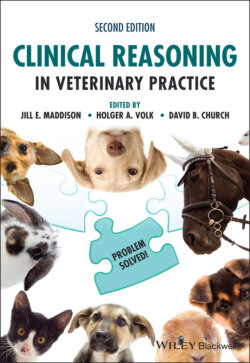Читать книгу Clinical Reasoning in Veterinary Practice - Группа авторов - Страница 62
What are the clues that the patient has primary or secondary GI disease causing vomiting?
ОглавлениеPrimary GI disease should be strongly suspected if:
An abnormality is palpable in the gut, for example, foreign body and intussusception
The vomiting is associated with significant and concurrent diarrhoea
The patient is clinically and historically normal in all other respects
The onset of vomiting significantly preceded any development of signs of malaise – depression and/or anorexia
The vomiting is consistently related in time to eating (although this can also occur with pancreatitis).
It is important to note, however, that primary GI disease cannot be ruled out even if none of the aforementioned features are present. For example, vomiting may be delayed for some hours (up to 24 hours) in animals with non‐inflammatory gastric disorders. Animals with foreign bodies or secretory disorders of the bowel often vomit despite not eating. In lower bowel disorders, vomiting more commonly occurs at variable times after eating.
Animals with primary GI may also be depressed and inappetant due to the lesion (there are neural inputs to the satiety centre in the hypothalamus from the gut) or due to the secondary effects of prolonged vomiting with dehydration or electrolyte disturbances. Usually, the malaise will occur at the same time or after the onset of vomiting.
Thus, the features in the aforementioned bulleted list are strong clues that primary GI disease is present, but their absence does not preclude it.
Animals with secondary GI disease are vomiting due to the effect of toxins on the vomiting centre or CRTZ or because of the stimulation of non‐GI‐associated peripheral receptors. The vomiting is usually unrelated to eating – except pancreatitis in dogs.
With secondary GI disease:
Animals will often have evidence from the history and/or clinical examination of abnormalities affecting other organ systems, for example, jaundice, polyuria/polydipsia (PU/PD).
Vomiting is usually intermittent, unrelated to eating and may often occur subsequent to the onset of other signs of malaise.
In general, animals that are vomiting due to extra‐GI disease are metabolically ill and are not usually bright, alert and happy.
If a patient has been metabolically ill (depressed and inappetant) for a significant period before vomiting was observed, then secondary GI disease is more likely.
Secondary GI causes of regurgitation will frequently have other systemic signs such as generalised weakness or metabolic malaise. It is usually only patients with megaoesophagus due to focal myasthenia gravis who present with regurgitation as their only clinical sign.
